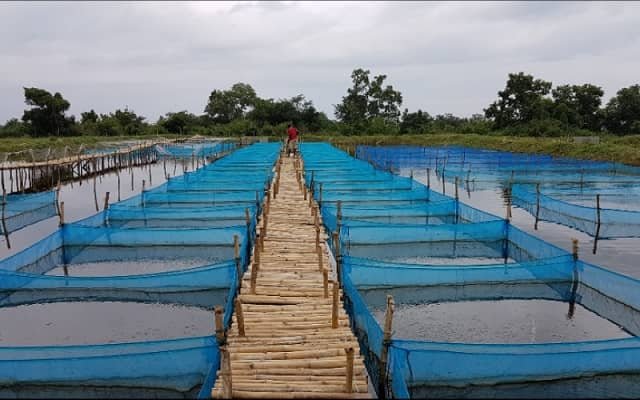Australia – Environmental health experts at Flinders University are advancing research into a highly sustainable wastewater recycling program by developing a cost-effective way to harvest microalgal biomass for use in biofuels and other applications.
The high-rate algal pond (HRAP) model, recycling wastewater at two regional South Australian locations at Kingston-on-Murray and Peterborough, uses algae and bacteria to treat the wastewater.
Research led by Flinders University Professor Howard Fallowfield and Dr Paul Young has presented details of a new system using slaked lime and magnesium concentration to concentrate the microalgae-rich biosolids produced in the HRAP at Kingston-on-Murray in SA’s Riverland.
Chemical reaction modelling was used to optimise the processing and the cost of chemicals was evaluated.
“This autoflocculation process was successful in harvesting the biosolids while significantly reducing the turbidity, nutrients and E. coli contamination left in the wastewater,” says lead author Dr Young, who completed a PhD at Flinders University.
These sustainable, low-energy systems are cost effective to run, and the capital cost of construction is about 40% of the previous system for effluent-only schemes, and marginally higher for blackwater schemes, the Flinders University research has shown.
While a conventional system requires 66 days to treat the wastewater, HRAPs can perform a similar level of treatment in 5-10 days. Its ability to remove pathogens is equal to, or better than, existing wastewater systems, Professor Fallowfield said after an earlier Flinders University study compared the Loxton-Waikerie District Council trial site at Kingston-on-Murray with a conventional system.
Professor Fallowfield says the study for the first time shows the HRAP wastewater treatment system could also be used to efficiently harvest microalgae grown in a low-cost environment – without the need for further investment in expensive infrastructure.
“The integration of treatment and biosolid recovery offers new configurations for the operation of HRAP-based wastewater treatment systems,” he says.
Stay Always Informed
Join our communities to instantly receive the most important news, reports, and analysis from the aquaculture industry.
Contact
Professor Howard Fallowfield
College of Science and Engineering
Flinders University
Tel: 8 7221 8581
Mob: +61 (0)431 500 874
Email: Howard,fallowfield@flinders.edu.au
Reference:
Paul Young, Jordan Phasey, Ilka Wallis, Dries Vandamme, Howard Fallowfield. Autoflocculation of microalgae, via magnesium hydroxide precipitation, in a high rate algal pond treating municipal wastewater in the South Australian Riverland. Algal Research, Volume 59, 2021, 102418, ISSN 2211-9264, https://doi.org/10.1016/j.algal.2021.102418.
Source: Flinders University
Editor at the digital magazine AquaHoy. He holds a degree in Aquaculture Biology from the National University of Santa (UNS) and a Master’s degree in Science and Innovation Management from the Polytechnic University of Valencia, with postgraduate diplomas in Business Innovation and Innovation Management. He possesses extensive experience in the aquaculture and fisheries sector, having led the Fisheries Innovation Unit of the National Program for Innovation in Fisheries and Aquaculture (PNIPA). He has served as a senior consultant in technology watch, an innovation project formulator and advisor, and a lecturer at UNS. He is a member of the Peruvian College of Biologists and was recognized by the World Aquaculture Society (WAS) in 2016 for his contribution to aquaculture.







